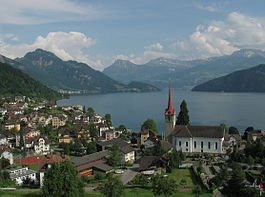Weggis
| Weggis | ||
|---|---|---|
 |
||
|
||
| Coordinates: 47°02′N 08°26′E / 47.033°N 8.433°ECoordinates: 47°02′N 08°26′E / 47.033°N 8.433°E | ||
| Country | Switzerland | |
| Canton | Lucerne | |
| District | Lucerne | |
| Area | ||
| • Total | 11.82 km2 (4.56 sq mi) | |
| Elevation | 435 m (1,427 ft) | |
| Population (Dec 2015) | ||
| • Total | 4,330 | |
| • Density | 370/km2 (950/sq mi) | |
| Postal code | 6353 | |
| SFOS number | 1069 | |
| Localities | Unterdorf, Oberdorf, Hinterdorf, Rain, Laugneri, Baumen, Dörfli, Tischital, Rigiblick, Hertenstein, Riedsort, Bannholz, Bodenberg, Sentiberg, Rigi Kaltbad | |
| Surrounded by | Arth (SZ), Ennetbürgen (NW), Greppen, Küssnacht (SZ), Meggen, Stansstad (NW), Vitznau | |
| Website |
www Profile (German), SFSO statistics |
|
Weggis is a municipality in the district of Lucerne in the canton of Lucerne in Switzerland.
It forms part of the northern shore of Lake Lucerne. The official language is German.
In about 800 the monastery of Pfäfers acquired the court of Wattawis. The municipality had been settled even earlier, however, because the name Weggis comes from the Celtic and meant Place of the Ferrymen. The freedom-loving inhabitants were subordinates of rule of the Habsburgs at some times. For both the monks and the Habsburgs the Lords of Hertenstein exercised regency. By 1332 Weggis and Gersau were free republics and allies of the neighboring Old Swiss Confederacy. This was confirmed in a treaty between them in 1359. Thereafter, the Lords of Hertenstein sold their rights to Lucerne in 1380. They administered Weggis until 1798 as part of the Landvogtei of Weggis. The citizens of Weggis resisted the Lords of Lucerne through multiple rebellions before 1588. In the peasant war of 1653 they sided with the rule of Lucerne for once. The municipality belonged to the district of Lucerne from 1798 until 1803, and thereafter to the newly formed Lucerne Authority. In 1798 the community of Vitznau was separated from Weggis and formed into an independent municipality. In 2005, the project of combining the three municipalities around Mount Rigi in Canton Lucerne was delayed indefinitely.
It lies on a projection into Lake Lucerne at the southwest base of Rigi, a mountain; such projections are named Weggiserbuchts for the one on which Weggis lies. The town has a famously mild climate and is well known for the numerous southern plants (chestnut trees, palms, grapes and orchids) that thrive there.
...
Wikipedia



